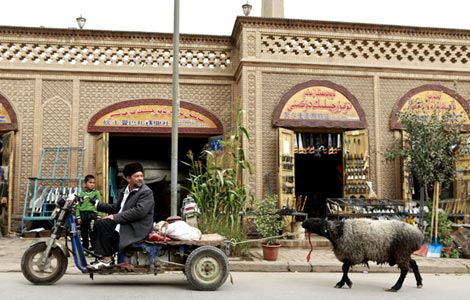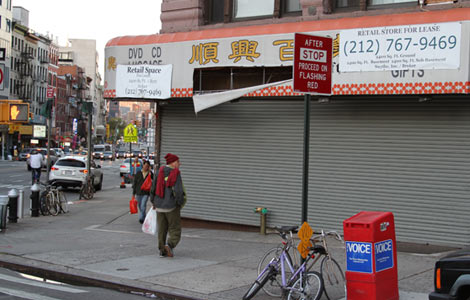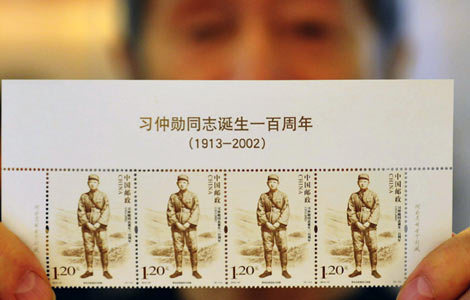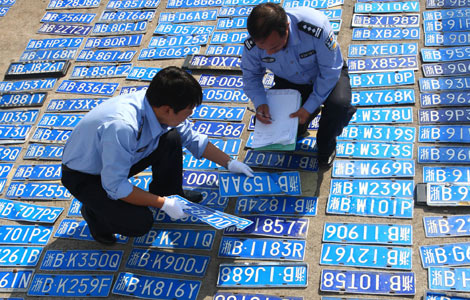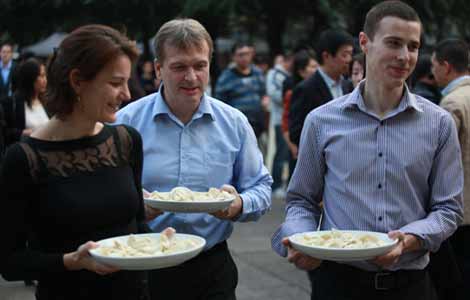From the Chinese Press
Updated: 2013-10-16 07:25
(China Daily)
|
||||||||
Why Chinese read fewer books?
It is worrying to know that on average Chinese people read only five books a year, a lot fewer than their counterparts in developed countries. This has led some people to seek legislation to help cultivate reading habit among Chinese people. But people, as readers, alone are not to blame for the sorry state of affairs given the huge waste of resources to achieve prosperity in the publishing world, says an article on gmw.cn. Excerpts:
At the beginning of this century, "green publishing" was made part of the country's development strategy, but the plan failed to help China catch up with the developed world when it came to implementation. Statistics show that China has the largest book inventory in the world which, according to market prices, is worth 88.4 billion yuan ($14.4 billion). The contents of most of these "invalid published" books are shallow. In other words, such books are devoid of any creativity and value.
Besides, these books are over-packaged, reflecting the wrong direction the publishing industry has taken. To raise the sale of their books, publishers have been focusing on "face-lift projects" by designing unnecessary hard-covers and plastic packing. But such books are seldom seen in foreign bookstores because such packaging is usually used for textbooks.
Extravagantly packaged books, coffee table editions, for example, are always bought by people as showpieces or to gift someone. As such, they have little reading value. Worse, over-packaging is not only a waste of precious resources, but also pushes up prices. This artificial increase in book prices has to some extent shut the door on genuine readers.
What publishers should remember is that only by providing good quality books to readers can such waste of resources be avoided and a genuine cultural prosperity cultivated.
Foreign products costlier in China
A survey conducted by a foreign media outlet shows that a cup of coffee at Starbucks costs more in Beijing than in other cities, such as Tokyo, New York City, London and Hong Kong. This is ridiculous, because Beijing's per capita real and disposable income is much lower than that in the aforementioned cities, says an article in Guangzhou Daily. Excerpts:
The price difference is not restricted to a cup of Starbucks coffee alone. For instance, a scoop of Haagen-Dazs ice cream in China costs about 30 yuan ($4.9) when one can buy a medium-sized tub of the ice-cream for only 50 yuan in a Canadian supermarket.
So why have even ordinary foreign-brands become high-end products in China? It's not because Chinese people are rich enough to afford such high prices. According to the International Monetary Fund, the per capita GDP of the Chinese mainland is $6,629, far less than $51,248 of the US.
A Starbucks outlet has to factor in material and operational costs. There may be little difference in material cost in this age of globalization, but the operational cost in China is definitely much lower than in the US. Although high taxes and logistics costs are ultimately transferred to consumers in the form of higher prices, the major reason for the high prices of foreign products could be attributed to Chinese people's consumption attitude. Driven by the blind pursuit of profit, Starbucks has positioned itself as a brand that offers better lifestyle, rather than products, to charge high prices.
To eliminate the price difference, we have to establish a free and fair market, lower taxes (the main factor responsible for high prices of foreign products) and establish a rational market environment that respects consumers. More importantly, Chinese brands have to improve their products to take on their foreign counterparts in the battle for market share.
(China Daily 10/16/2013 page9)
Most Viewed
Editor's Picks

|

|

|

|

|

|
Today's Top News
A life devoted to China-US ties
US inches toward deal to reopen govt
Alcoa CEO to be feted by US-China Committee
Hong Kong and AmEx throw culinary extravaganza
'Against human nature'
Nation honors father of Xi Jinping
Information transparency vital for image
$100b trade target for 2017
US Weekly

|

|
